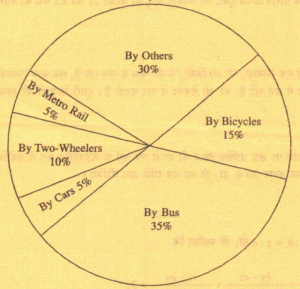(Paper) SSC Section Officer (Audit) PAPER II - ARITHMETIC: Nov 2008
Paper : SSC Section Officer (Audit) PAPER II - ARITHMETIC: Nov 2008
Exam Name: Section
Officer (Audit) Paper II
Conducted By: Staff Selection Commission (SSC)
Conducted On: November 30, 2008
Maximum Marks: 100
Time Allowed: 2 Hours
Negative Marking: Zero (No Negative Marking)
Type of Questions: Conventional Type (Descriptive/Subjective)
This is in continuation of the SSC Section Officer (Audit) Exam’s Paper I. Paper II consisted of Arithmetic of class X level.
PAPER II - ARITHMETIC
1. A man spends 75% of his income, when his income is increased by 20%, he increases his expenditure by 10%. By how much per cent are his savings increased? [4]
2. The marked price of a watch is Rs. 400. After allowing a discount of 25% on the marked price, there was a loss of Rs. 20. Determine the loss per cent. [4]
3. The average of the squares of five consecutive positive integers is 66. Find the average of these five integers. [4]
4. The radii of three concentric circles are in the ratio 1: 2: 3. Find the ratio of the area between the two inner circles to that between the two outer circles. [4]
5. A dealer allows a discount of 12% on the marked price. How much per cent above the cost price, must he mark his goods so as to make a profit of 10%? [4]
6. From a 5 litres of 20% solution of alcohol in water, 2 litres of solution is taken out and 2 litres of water is added to it. Find the strength of alcohol in the new solution. [6]
7. A alone can complete a piece of work of Rs. 300 in 6 days; but by engaging an assistant, the work is completed in 4 days. Find the share to be received by the assistant. [6]
8. The marked price of a watch was Rs. 820. A man bought the same for Rs. 570.72 after getting two successive discounts of which the first was 20%. Find the rate of second discount. [6]
9. A shopkeeper mixes two varieties of tea - one costing Rs. 75 per kg and the other costing Rs. 50 per kg in the ratio 3: 2. If he sells the mixed variety at Rs. 62.40 per kg, find his gain or loss per cent.
10. The average of the age of a husband and wife, five years ago, was 25 years. The average of the present age of husband, wife and a child, born during the time, is 21 years. Determine the present age of the child. [6]
11. A train, 100 m long travelling at 60 km/hr passes another train, twice as fast as this train and travelling in opposite direction, in 10 seconds. Find the length of the second train. [6]
12. If the difference between compound interest, compounded half-yearly, and simple interest on a sum of money at 8% per annum for 1 year is Rs. 30, find the sum. [6]
13. If x: a = y: b = z: c, then show that
[(ax-by)/(a+b) (x-y)] + [(by-cz)/(b+c) (y-z)] + [(cz - ax)/(c+a) (z-x)] = 3 [6]
14. A and B can complete a piece of work in 8 and 10 days respectively. However, they work alternately, one day each, with A beginning the work. In how much time will the work be completed? [8]
15. A and B are partners in a business. If B invested 1/5th of the capital for 10 months and received 1/3rd of the profit after one year, then determine for how many months A invested his capital. [8]
16. Water is flowing at the rate of 5 km/hr through a cylindrical pipe of diameter 14 cm into a rectangular tank which is 50 m long and 44 m wide. Determine the time in which the level of water in the tank will rise by 7 cm. [8]
17.

The pie-chart, given above, shows various modes of transport used by 2400 officers of an organisation in a city to reach their office. Study the chart and answer the following questions:
(i) How many officers travel to their office by Metro Rail? [2]
(ii) How many more officers travel by two-wheelers than those travelling by cars? [2]
(iii) What should be the corresponding central angle in the n -chart for showing officers travelling by bus? [2]
(iv) How many officers do not take Metro Rail, a bus, a car or a two-wheeler as their mode of transport in reaching their office? [2]

